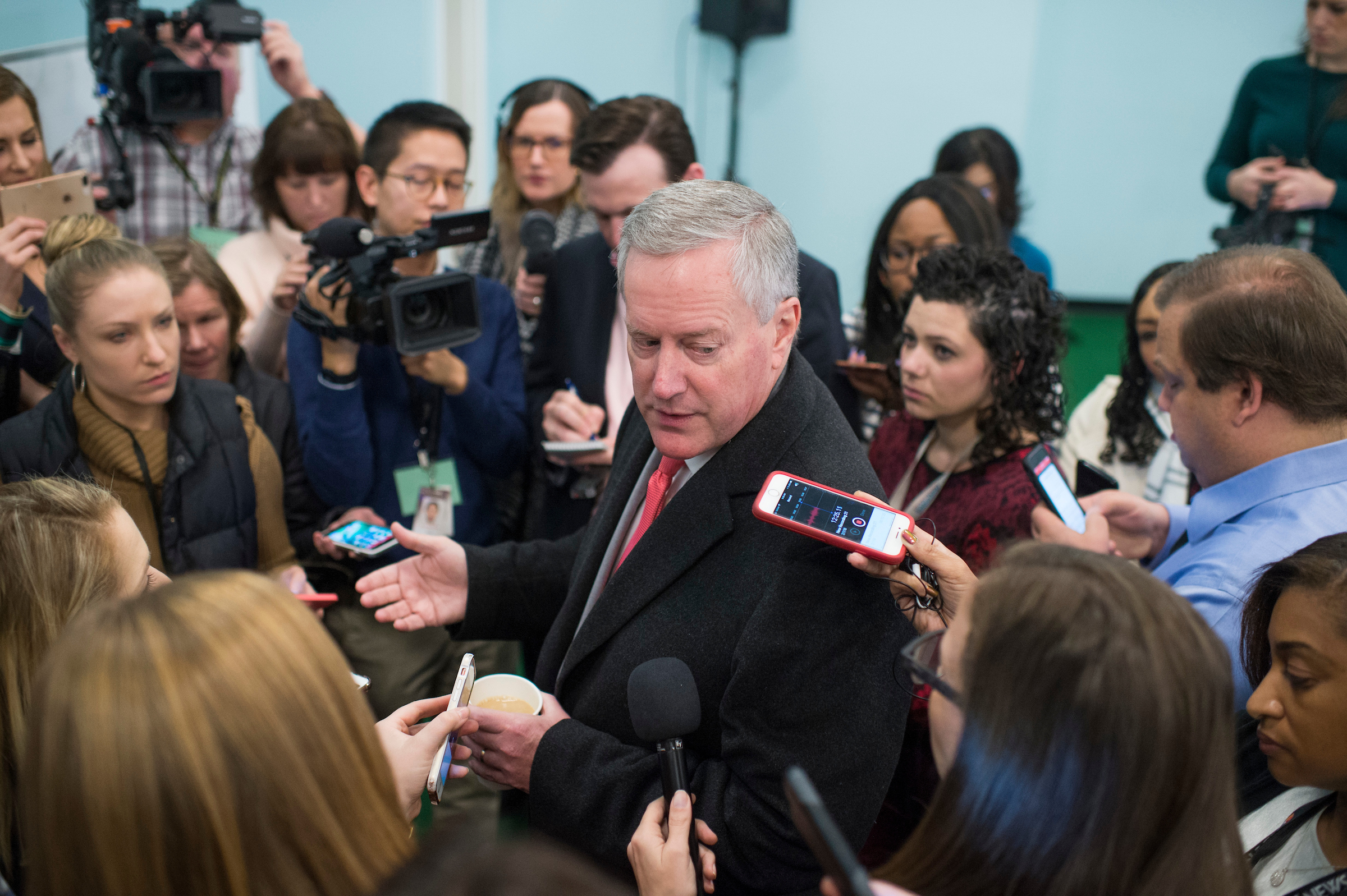GOP Leaders Confident There Won’t Be a Second Shutdown
Optimism comes despite current opposition from House conservatives and defense hawks

WHITE SULPHUR SPRINGS, W.Va. — Republican leaders are confident they can avert another government shutdown next week but provided no clear update on whether a deal on the spending caps or immigration could be reached in the near-term.
Congress has yet to pass a long-term spending bill for fiscal year 2018, relying on a series of short-term continuing resolutions to keep the government open. House and Senate leaders from both parties are negotiating a possible two-year spending deal, but optimism about an agreement being close has degraded.
Negotiations on a larger spending bill have been stymied amid inaction on unrelated legislation to address the pending expiration of a program that covers undocumented immigrants who come to the country as children.
Another short-term CR is expected to keep the government open past next Thursday. The length of that measure has yet to be decided.
Watch: Why Does Congress ‘Retreat’?
Democrats, whose votes are needed in the Senate to pass a spending bill, have demanded action on the Deferred Action for Childhood Arrivals program that ends on March 5 as part of a broader budget agreement on spending caps and other funding priorities. That was a major factor in a recent three-day government shutdown that ended after both chambers advanced a continuing resolution that expires on Feb. 8.
But the larger factor suggesting the possibility of a second shutdown is opposition from House conservatives and defense hawks to another stopgap funding measure. They are seeking increased funding for the Department of Defense that would last through the remainder of fiscal 2018.
Key Republicans believe, despite the need for Democratic support in the Senate and the lack of progress on an immigration bill, that there will not be another shutdown. But leaders have not addressed the issues within their own party.
“There’s a mutual agreement on both sides that shutdowns aren’t good, so I don’t think there is going to be another one,” Senate Republican Conference Chair John Thune of South Dakota told reporters Thursday morning. “Whatever happens going forward in terms of an agreement on budget caps … and whatever happens with respect to immigration … we will see a continuation of the funding.”
Rep. Mark Meadows, chairman of the conservative 36-member House Freedom Caucus, said he’s not optimistic about a budget.
“I don’t see the probability of the Freedom Caucus supporting a fifth CR without substantial changes by Feb. 8 unless we see dramatic changes,” the North Carolina Republican said. “We’ve had the land of promise for four times now on CRs. It’s time to put some real commitment to the effort before a fifth CR.”
A real commitment means “a precondition to a vote of something actually happening, not rhetoric,” Meadows said. The Freedom Caucus has been seeking action on defense spending, as well as a conservative immigration bill. He declined to say whether a real plan to advance one or both of those would be needed to win their support.
Despite steep standards for winning his caucus members, likely needed to advance a CR through the House given Democratic opposition, Meadows also predicted there will not be a government shutdown after Feb. 8.
Thune was confident that the leaders of both parties could come together on a spending deal and that the government would not be funded on a CR for the remainder of fiscal year 2018.
“We’ve got to get a deal on caps. We have too many Republicans who are just adamant that we’ve got to come up with a defense number that takes into consideration the requirements that we need to meet for national security,” he said.
House Republican Conference Chair Cathy McMorris Rodgers of Washington said leaders are encouraged by the work that’s been done so far in the negotiations.
“We need that agreement and we encourage the Senate, especially Democrats in the Senate, to join and come to a solution so we can move forward,” she said.
Infrastructure interplay?
Democrats have insisted that increases in nondefense funding match an increase in defense funding. One proposal Thune appeared to back was putting additional nondefense funding toward a possible infrastructure package, though it is unlikely such a proposal would receive Democratic backing.
“It would make some sense,” he told reporters. “If we’re going to plus-up significantly nondefense discretionary and try and do the kind of infrastructure that the administration is talking about … we have to pay for it somehow.”
Thune said if such an agreement could be reached, the funding allocated toward infrastructure would likely be a down payment on the $200 billion in federal funding President Donald Trump is seeking for his $1.5 trillion package.
“It’s probably all fungible,” he said.
Democrats, however, have talked about nondefense increases going toward opioid abuse prevention, veterans and health programs. They’ve not once mentioned infrastructure as part of that, likely assuming it would be a separate funding conversation from the caps.
“They’ve got a long list of stuff that they want to fund too, but they also have people who are clearly interested in infrastructure,” Thune said, but noted some Democrats don’t want to pay for additional funding.
As Congress lurches from one CR to the next, discussions over both a spending and immigration bill have halted virtually all other legislation. That could prevent Republicans from advancing an infrastructure proposal or proceeding to other legislative priorities for 2018.
“When the Democrats are reassured that they are going to get the debate on immigration, which they will … I would hope that actually prior to that, now they would enter into negotiations on budget caps,” Thune said. “That has to get resolved, and I think they’ve used the immigration issue as leverage to try and keep from having an honest conversation about that.”





